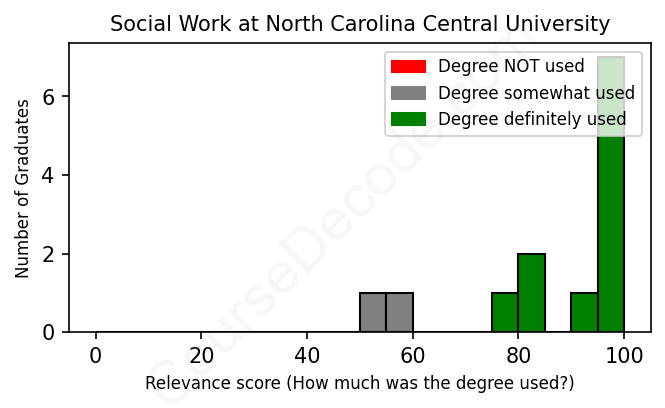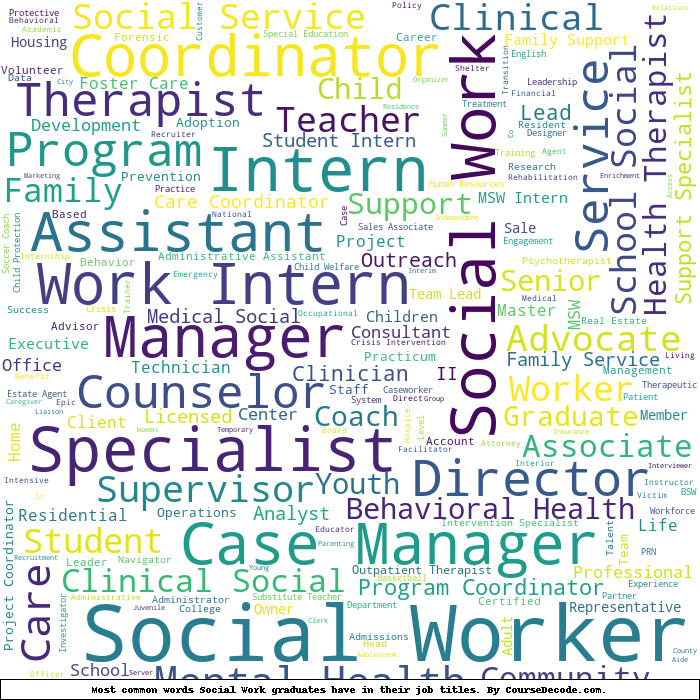
First, some facts. Of the Social Work graduates from North Carolina Central University we've analyzed , here's how many have used (or NOT used) their degree in their career:

These are estimates based on AI analysis of 13 LinkedIn profiles (see below).
The verdict? Significantly above average. Overall, with an average relevance score of 87%, Social Work graduates from North Carolina Central University have a much higher likelihood (+20%) of finding work in this field compared to the average graduate across all fields:
And for comparison, here's the chart for all profiles we've looked at across all degrees.
Also, after graduating, 69% of these graduates have pursued further education other than another Bachelor's degree (such as a Masters degree or other), compared to the average across all profiles of 35%. This suggests you may need more than just a Bachelors degree to be competitive as a Social Work graduate.
See the details:
|
Relevance score: 81% We think this person has gone into a career highly relevant to their degree. We think this person has gone into a career highly relevant to their degree.
DEGREE INFOGraduated in 2015 from North Carolina Central University with a Bachelor of Social Work in Social Work. Also pursued further education since (see below). JOB HISTORY SINCE GRADUATIONSocial Worker II, Intern Durham Country Department of Social Services Aug 2016 - May 2017 Social Worker  Durham Center for Senior Life Apr 2015 - Jul 2017 TASC Care Manager  Coastal Horizons Center, Inc. Jul 2017 - Feb 2018 TASC Care Manager  Coastal Horizons Center, Inc. Jul 2017 - Present Community Support Team  Carolina Outreach, LLC Feb 2018 - Present FURTHER DEGREES DONE SINCE GRADUATINGMaster of Social Work - MSWNorth Carolina State University 2016 - 2017 ABOUTCertified in Mental Health and Adult First Aid/AED/CPR.Familiar with Microsoft Word Suite Applications.North Carolina Senior Health Insurance Information Program Counselor.Certified as a North Carolina Options Counselor.Ability to process paperwork and maintain confidentiality of documentsFamiliar with operating Cisco Phone Systems.Skilled in interacting with clients of all socioeconomic backgroundsExceptional writing and communication abilities.Advanced Trainings in all Social Work policies.Proven record of innovative and effective work ethic.Possess strong analytical and research skills.Demonstrates a keen eye for details and evaluation. |
The top 10 most common jobs done by the graduates we've analyzed (ranked most common to least) are:
When looking at the career paths of graduates from North Carolina Central University with a degree in Social Work, it seems that there’s a solid number of them who have landed jobs that directly connect to their education. Roles like Social Worker, Permanency Planning Social Worker, and Clinical Supervisor are common and clearly tie back to the skills and knowledge gained in their social work programs. Many of these jobs involve working with individuals or families in need, managing cases, and applying various social work methodologies to make a real difference in their communities. It’s evident that a good chunk of graduates have had the chance to step right into positions that align well with their degree, which is really encouraging for those thinking about this career path.
However, not every job on the list is directly relevant to social work. Some positions, like Customer Service Specialist or Brand Ambassador, don’t really utilize the specific skills developed during their studies. These jobs might allow for some transfer of interpersonal skills but lack the core competencies that you'd typically expect from a social worker. Overall, while most graduates seem to have found their way into relevant social work roles, there are still those who have taken on jobs that veer away from their training, which can be pretty common in any field. So, for students considering a career in social work, it’s great to see that many find fulfilling positions, but it's also good to keep in mind that the job market can sometimes lead you in unexpected directions!
Here is a visual representation of the most common words in job titles for Social Work graduates (this is across all Social Work graduates we've analyzed, not just those who went to North Carolina Central University):

Graduates from North Carolina Central University who have specialized in Social Work seem to carve out diverse yet relevant career trajectories in the field. Based on the information provided, many of these graduates typically launch their careers immediately after graduation by securing roles as social workers, care managers, or coordinators. For example, those who graduated around 2015 often started as Social Workers or Care Managers in various organizations, indicating a strong initial alignment with their degree. As they advance in their careers, by the five-year mark, many have moved into more specialized roles, like Licensed Clinical Social Workers or clinical supervisors, highlighting a natural progression toward more responsibility and expertise in their fields.
Looking further down the line, around the ten-year mark, we see that several individuals have taken on leadership roles or even co-owned businesses related to mental health services, which speaks to both career growth and entrepreneurial spirit. While there are a few cases where individuals shifted into unrelated fields early in their careers—such as customer service roles—most appear to have remained within the social work and mental health sectors, adapting to various needs within those areas over time. Overall, it seems like a degree in social work from NCCU can lead to fulfilling and impactful careers, keeping graduates connected to their passion for helping others while also offering opportunities for further specialization and advancement in the field.
Getting a Bachelor's degree in Social Work at North Carolina Central University can be pretty challenging, but it’s not the hardest out there. You'll dive into topics like human behavior, social justice, and community development, and you might have to tackle some tough assignments and projects along the way. The coursework can be intense, especially when you start dealing with real-life case studies and fieldwork, but if you're passionate about helping others and are willing to put in the effort, it becomes manageable. So, while it’s definitely a workload, it’s also rewarding for those who are genuinely interested in the field. Overall, it’s more demanding than some degrees, but definitely doable if you stay focused and engaged!
Most commonly, in the LinkedIn profiles we've looked at, it takes people 4 years to finish a Bachelor degree in Social Work.
Looking at the job paths of these Social Work grads from North Carolina Central University, it's a mixed bag when it comes to making decent money. Many started with internships or entry-level positions, like Social Worker II or customer service roles, which typically don't pay too well. As they gained experience, some moved into more specialized roles like licensed clinical social workers or supervisors, which can definitely help boost their income. However, social work as a field often doesn't lead to huge salaries compared to other professions, especially early on. So, while some of these grads have probably found more financial stability as they progressed in their careers, generally speaking, most likely aren’t rolling in cash just yet. It's all about that steady climb!
Here is a visual representation of the most common words seen in the "about" section of LinkedIn profiles who have a Bachelor degree in Social Work (this is across all Social Work graduates we've analyzed, not just those who went to North Carolina Central University). This may or may not be useful:

Here are all colleges offering a Bachelor degree in Social Work (ordered by the average relevance score of their Social Work graduates, best to worst) where we have analyzed at least 10 of their graduates: